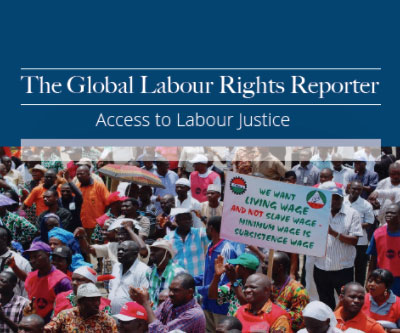
Feb 3, 2021
Labor lawyers and other worker rights advocates from around the world took part in the launch of a new law journal dedicated to advancing justice for workers.
The Global Labour Rights Reporter, a project of the Solidarity Center’s International Lawyers Assisting Workers (ILAW) Network, intends to be a global forum for labor and employment law practitioners, who also will grapple with the legal and practical issues that directly affect workers and their organizations.
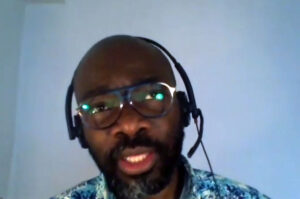
The journal “gives us the language to fight our battles, it gives us the language to discuss our struggles”—Paapa Danquah
Authors who contributed to the first issue, with its theme, “access to justice,” yesterday shared their contributions to the journal, which includes 10 articles and is available online in English, French and Spanish.
“The labor movement is about expanding justice for all workers,” Solidarity Center Executive Director Shawna Bader-Blau said in opening remarks. “The network is the first effort to bridge and build a pro-labor network of lawyers that has labor justice at its heart.”
The journal “gives us the language to fight our battles, it gives us the language to discuss our struggles,” said Paapa Danquah, legal officer for the International Trade Union Confederation (ITUC).
The Solidarity Center launched the ILAW Network in December 2018 as a global hub for worker rights lawyers to exchange ideas and develop strategies to best represent the rights and interests of workers and their organizations. Since then, more than 600 hundred individuals and organizations from more than 70 countries have joined.
Justice Delayed, Justice Denied

Ensuring reparations are efficient and timely is key to achieving worker justice, says Matías Cremonte. Credit: Solidarity Center
Several participants discussed workers’ lack of access to courts and the legal process as a major block for workers attaining justice.
For instance, it took 22 years to get a judgment in the case of a manufacturing plant in Brazil, where 60 workers were killed, 59 of them women, said Matías Cremonte, regional vice-president of the Latin American Association of Labor Lawyers.
“When it came time to enforce the decision, it couldn’t be done because the conditions don’t exist anymore,” he said. “Unjustified backlogs and delays by the government led to very profound damage.” Ensuring reparations are efficient and timely is key to achieving worker justice, he said.
Cremonte and María Paula Loranzo co-authored “The Right to Fair and Satisfactory Working Conditions: Risk Prevention and Access to Justice,” which explores workers’ access to compensation for occupational safety and health violations in Argentina, especially since the COVID-19 pandemic.

Raisa Liparterliani shared how unions in Georgia succeeded in restoring many worker rights that were eliminated. Credit: Solidarity Center
In addition to the institutional and practical challenges the judiciary faces, “it is not uncommon that employers will maintain a blacklist of the so called unwanted and dangerous—those who have applied to court to defend their rights,” Raisa Liparterliani, deputy chairperson of the Georgian Trade Union Confederation, wrote in the journal.
Speaking today, Liparteliani also documented concrete measures to address worker rights, sharing how unions succeeded in restoring many worker rights that were eliminated during 2005 reforms.
Discussing his article on Zimbabwean court practices, scholar Munyaradzi Gwisai said limited access to courts has denied workers a cornerstone of labor justice. “You can have rights in the constitution and labor rights, but they can be frustrated by the judiciary.”
Holding Global Supply Chains Accountable
By bringing together labor lawyers and worker rights activists, the Global Labour Rights Reporter seeks to share new strategies for ensuring worker justice, and Avery Kelly at the Corporate Accountability Lab described one such effort to enforce the legal rights of garment workers and others in the corporate supply chain.
The program, which sought to address the lack of enforcement in supplier codes of conduct, involved 14 U.S. companies, including major apparel brands, signing contracts giving supply chain workers legal rights to enforce the supplier codes of conduct. Kelly and her co-authors documented the case study in their journal article.
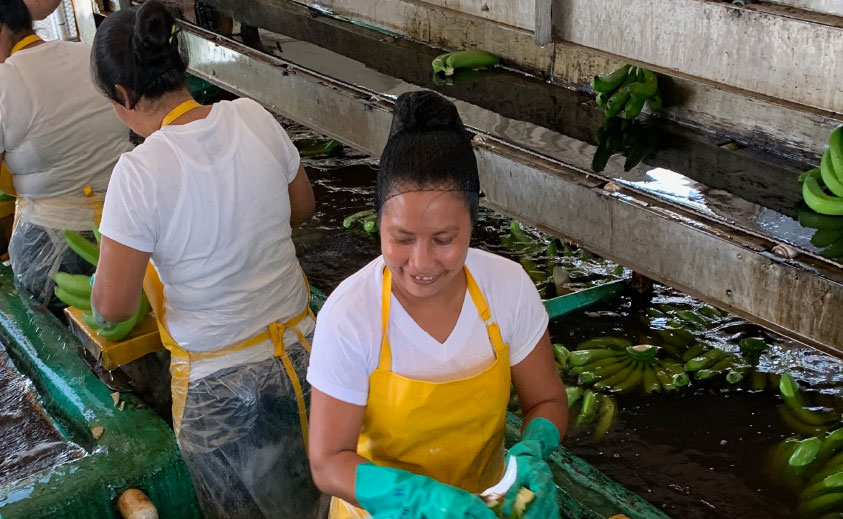
Jan 28, 2021
Unionized workers on Guatemala banana plantations earn more, work fewer hours, face less sexual harassment, and have safer workplaces, including during the Covid-19 pandemic, according to a Solidarity Center report. (The report also is available in Spanish.)
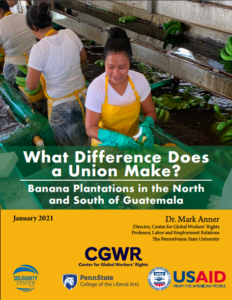 “What Difference Does a Union Make? Banana Plantations in the North and South of Guatemala” finds that non-unionized workers in the country’s south earn less than half the hourly pay of unionized workers in the north, while working 12 hours per week more. Thirty-nine percent of all bananas sold in the United States are produced in Guatemala.
“What Difference Does a Union Make? Banana Plantations in the North and South of Guatemala” finds that non-unionized workers in the country’s south earn less than half the hourly pay of unionized workers in the north, while working 12 hours per week more. Thirty-nine percent of all bananas sold in the United States are produced in Guatemala.
Working conditions are very similar to modern slavery at the two-thirds of Guatemalan banana plantations not unionized, said César Humberto Guerra López, national secretary of labor and conflicts for SITRABI (Union of Banana Workers of Izabal). “The Labor Ministry and the courts are guardians of business interests, they are not on the side of the workers.” Guerra spoke at a Solidarity Center panel event yesterday to discuss the report’s findings. (Watch the full event here.)
While plantation workers in the North on average are paid $2.52 an hour, those along the Pacific Coast in the south are paid $1.05 an hour, said Mark Anner, director of the Center for Global Workers’ Rights and professor of labor and employment relations at Pennsylvania State University. Anner is author of the report, which surveyed 210 workers between September 2019 and March 2020.
“Workers without trade unions around the world, and Guatemala in particular, have lower paying jobs, more dangerous jobs, jobs with abuse and fewer rights,” said Solidarity Center Executive Director Shawna Bader-Blau in the panel’s opening remarks. “So what difference does a union make? It makes all the difference to workers in Guatemala.”
Far More Sexual Harassment at Nonunion Banana Plantations
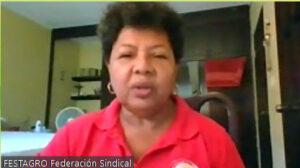
Irís Munguía discussed the challenges women on banana plantations face when they don’t have a union to advocate for their rights. Credit: Solidarity Center
In one of the report’s most notable findings, 59 percent of women surveyed in non-union banana packing plants say they face sexual harassment and other forms of gender-based violence at work compared with 9 percent of women at unionized packing plants. Non-union workers are 81 percent more likely to face verbal abuse than union workers.
“If a woman reports someone who is harassing her, that woman could be fired. Because he’s the boss and we are the workers,” Irís Munguía said, speaking through a translator. Munguía, women’s coordinator of the Honduran Federation of Agro-industrial Unions-FESTAGRO, was the first woman coordinator of COLSIBA, the Latin American coordinating body of agricultural unions.
The report cites Carmen, a SITRABI union leader, who says sexual harassment and other forms of gender-based violence are much lower in unionized facilities because unions hold employers accountable. “If a man touches me, I can inform the company. Managers have been fired [for sexual harassment]. There is more respect now. And if someone doesn’t respect us, the issue goes to the union-management committee.”
Banana Workers Killed for Seeking to Form Unions
Workers have not formed unions in the south because “there is fear, panic to organize in a union,” according to Guerra. He said that when workers in the southern region last attempted to form a union in 2007, one union leader was killed and the daughter of another union leader raped, while other union activists received threats. “The consequences of fear continue to be very palpable for the workers,” he said.
Anner said his research found that between 2004 and 2018, 101 union activists were killed in Guatemala for trying to form unions and achieve decent work. The majority of those murders took place in the Southern part of Guatemala, in the regions where non-union banana plantations have expanded in the last two decades.
With no unions to champion worker rights, banana plantations and packing plants in the south do not comply with laws limiting working hours, regulating wages or ensuring safety, Guerra said. Workers labor 12 hours a day, Monday through Saturday.
Agricultural and production facilities have moved work to the south to pay the lowest wages. As the report makes clear, the root causes for the push for low wages goes to the top of the supply chain. “Fruit companies no longer wield power in the production process, that power is slowly being displaced by mega supermarkets that constantly look for ways to squeeze prices,” the report says.
“Wal-Mart requires such low prices that multinational corporations are pushing the directly owned facilities in the north to outsource to the south,” Anner said. And that means seeking out plantations in a nonunion region where wages are brutally low.
The report also finds that all production facilities that engage in worker rights violations have been inspected by private certification programs, including by Global G.A.P. and Rain Forest Alliance. “Management tells workers what to say to the certification inspectors before the inspectors arrive,” the report finds.
The Union Difference
Guerra and Munguía, long-time union leaders who began working on banana plantations in their teens, shared their successes in helping workers achieve their rights through unions.
In the north, SITRABI has 17 negotiated collective agreements, and wages at one plantation, a Del Monte subsidiary, are three to four times higher than at non-union facilities, Guerra said.
Munguía described a landmark regional agreement COLSIBA negotiated with Chiquita that ensures zero tolerance for sexual harassment and gender-based violence at work. The agreement covers banana workers in Costa Rica, Guatemala, Honduras and Panama. The agreement shows “the importance and the great difference in belonging to the union and not being unionized.”
“Dignity on the job and just livelihoods—this is something we can reach only through union organizations,” Munguía said.
Joell Molina, Solidarity Center trade union strengthening director, moderated the panel. The report was commissioned by the Solidarity Center under the USAID-funded Global Labor Program and written by Center for Global Workers’ Rights/School of Labor and Employment Relations at Penn State University, is co-published by the Center for Global Workers’ Rights.
Jan 7, 2021
- Carl Gershman, President National Endowment for Democracy
- Derek Mitchell, President, National Democratic Institute
- Dan Twining, President, International Republican Institutes
- Shawna Bader-Blau, Ex. Director, Solidarity Center
- Andrew Wilson, Ex. Director, Ctr. For International Private Enterprise
[PDF]
“We are appalled by the violent and seditious assault at the United States Capitol today. Nonetheless, we are confident in the enduring strength of American institutions, and that any attempts to subvert our democracy will not succeed. Those involved in illegal activity today must be held to account.”
“A fundamental tenet of democracy is the peaceful contest of ideas among fellow citizens under law. After a free and fair election, when incumbents are defeated, a peaceful transfer of power must result. It is through such democratic processes that fundamental freedoms are protected, and opportunity and justice are possible for all. We know from decades of experience that the job of democracy is never done, and that democracy is fragile. But we also know it is resilient.”
“We have faith that our country will soon begin a period of national healing that will renew our democracy. As Americans continue on their difficult but historic journey to form a “more perfect union” at home, we want to reaffirm our commitment to stand in solidarity with all those around the world who share democratic values and who continue to fight against all those who would subvert them.”
Media contacts:
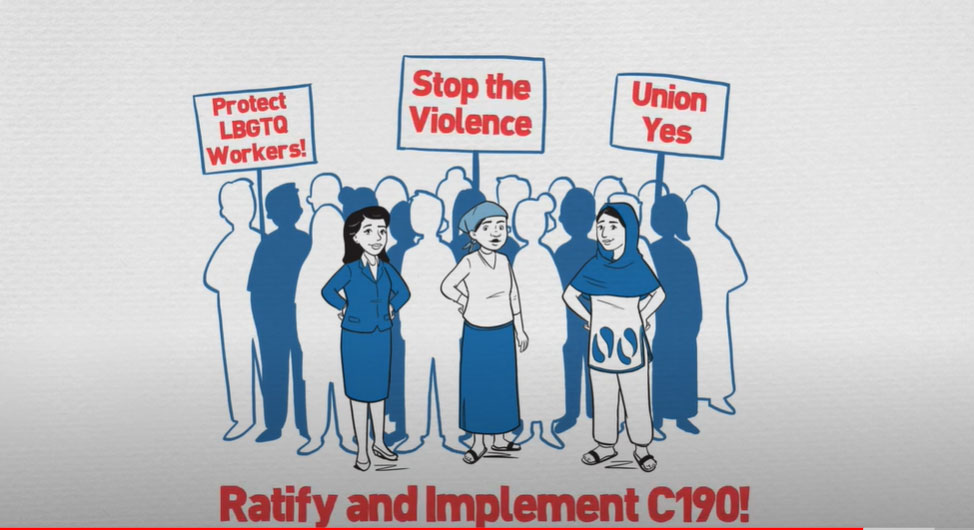
Dec 10, 2020
As union activists around the world urge their governments to ratify International Labor Organization Convention 190, the first global standard to address gender-based violence and harassment (GBVH) in the world of work, they also are educating and mobilizing members, allies and public to take action to end GBVH.
Now, Solidarity Center union activists and partners have a new tool for their campaign: An educational video that explains gender-based violence at work, describes how C190 can address it and how union activists can take the next steps to ensure it is ratified by countries around the world.
The whiteboard animation video—which shows the viewer images being drawn on the screen accompanied by narration—points out that GBVH is one of the most common human rights violations in the world that can affect any worker, but women most of all due to unequal power relations. It highlights how C190 is the first global standard to outline how governments, employers and unions must prevent GBVH—and makes clear that C190 is effective only if governments formally endorse it and pass laws implementing it.
The video updates the Solidarity Center’s popular GBVH whiteboard video for the global campaign to adopt a convention covering gender-based violence and harassment at work. That video was translated into Spanish, Russian, Georgian, Sinhala and Tamil.
Watch the video, share it widely and spread the word. As the video says: “Violence should not be part of the job for any of us.”
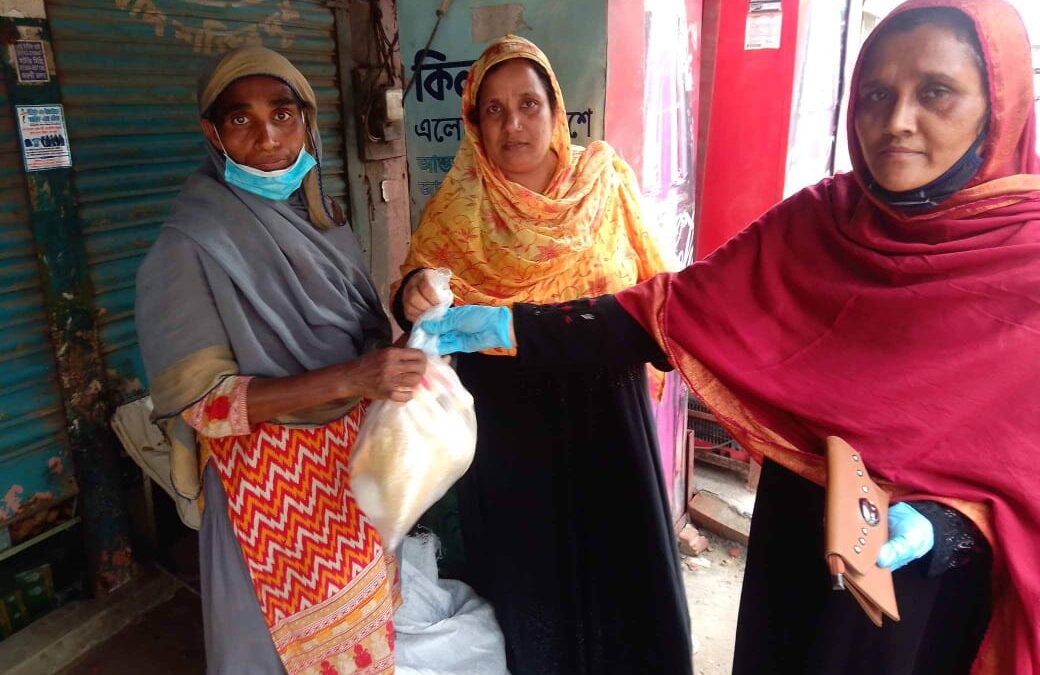
Dec 10, 2020
As garment factories shut down in Bangladesh during the novel coronavirus pandemic, leaving workers without wages or access to support services, unions and Worker Community Associations (WCAs) around the country rapidly shifted to address the crisis, with Worker Community Centers (WCC) serving as a lifeline for workers, their families and their communities.
The community associations and centers are part of an ongoing USAID-funded Solidarity Center Workers’ Empowerment and Participation project (WEP) launched in 2019 to improve working conditions for workers in the ready-made garment and shrimp and fish processing sectors in Bangladesh. The project builds on the strong foundation WEP established between 2015 and 2019.
In July, the Solidarity Center delivered 30,000 COVID-19 awareness leaflets to its partners in Dhaka and nearby Ashulia, Gazipur, Narayanganj and Savar; as well as Chattogram, Jashore and Khulna. The pamphlets, distributed to thousands of workers and community members by WCC coordinators and union federation organizers, highlight key safety measures during the COVID-19 pandemic, such as proper hand washing, social distancing and wearing masks at all times when outside the home.
“It’s important for us to do our part to get accurate information to everyone in the community to help stop the spread of this deadly virus,” says Rita Saha, WCC coordinator in Rupsha. “Our WCC leaders and members have extensive networks, and we love raising awareness and helping our community.”
Ensuring Fair Wages, Decent Working Conditions
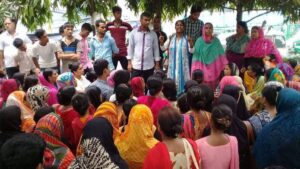
When AFCO garment factory closed during COVID-19, workers received unpaid wages due to their union’s efforts. Credit: Solidarity Center
Even as WCCs and unions distributed resources, including food baskets to families of furloughed garment workers during Ramadan, they carried on the crucial work of ensuring workers receive fair pay during factory shutdowns.
As AFCO Abedin Garments Ltd. got set to permanently close in April without paying workers’ back wages, the Garments Workers Solidarity Federation (GWSF) launched negotiations with management and encouraged the Department of Inspection for Factories and Establishments and the Bangladesh Garment Manufacturers and Exporters Association to intervene. Ultimately, factory management agreed to pay the workers 60 percent of their April salary, one month’s base salary and 60 percent of the base wage for each full year of service. Eligible workers also will receive seven days’ annual leave.
In June, Hop Lun Apparels Ltd., Sammilito Sramik Union (HLALSSU) successfully negotiated a 24-point collective bargaining agreement with factory management covering more than 2,000 workers.

Union members at Hop Lun garment factory negotiated a contract that addresses gender-based violence at work. Credit: Solidarity Center
“When we submitted demands and negotiated with management, we gave special emphasis on the issues of women,” says Aklima, factory union president. “The guarantee of promotion of women to higher posts and the establishment of sexual harassment committee will empower the women and provide safeguards against sexual abuse and harassment in our factory.”
Training, Legal Support
The Workers’ Empowerment and Participation program also carried out leadership training and legal support that included advising more than 450 workers and winning $10,835 in court for 41 workers. Additional accomplishments over the past year include:
- 27,213 workers covered by unions in more than 200 factories
- 104 women elected to leadership positions
- 2,209 new community members actively participating in Worker Community Associations
- 21 new unions and worker-driven organizations in the garment and shrimp processing sectors and 12 new garment unions registered
- 39 worker-leaders trained in achieving gender equality or women’s empowerment at public and private organizations
“The WCC training sessions helped make me more confident and brave, and have helped me understand gender-based violence and harassment,” says one woman garment worker. “This has made it easier for me to handle tough situations at my workplace and in the community.”
Find out more about the Workers Empowerment Project.






 “
“



